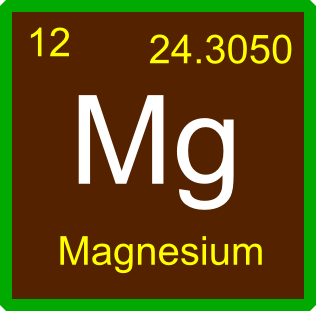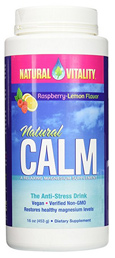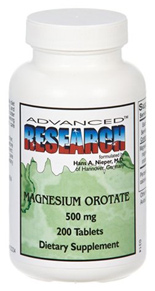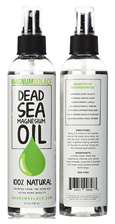Magnesium Rich Foods and Beverages: Juicing for Magnesium

Magnesium (Mg) is an important element for a healthy living. You should know more about it in order to make informed decisions, for example, about magnesium supplementation or how to get enough of it from foods and beverages.
Magnesium is not really a trace element, like iodine, selenium, zinc, copper, manganese, and others. In general, trace elements are defined as elements whose intake is between 50 micrograms and 18 milligrams per day.
In contrast, the RDA for magnesium is much larger: somewhere in the range from 400 to 420 mg per day for men and 310 to 320 mg per day for women.
 About 60-65 percent of magnesium in your body is found in the skeletal system, about 25 percent in the muscles, and the remaining 10 percent in the other cell tissues and fluids.
About 60-65 percent of magnesium in your body is found in the skeletal system, about 25 percent in the muscles, and the remaining 10 percent in the other cell tissues and fluids.
Table of Contents
- 1 Symptoms of Mg Deficiency
- 2 Supplementation with Magnesium
- 3 Magnesium and Calcium
- 4 Magnesium in Foods and Beverages
- 5 Magnesium Content in Foods
- 6 Vegetables:
- 7 Grains:
- 8 Legumes:
- 9 Nuts:
- 10 Seeds:
- 11 Seafood:
- 12 Juicing for Magnesium
- 13 Magnesium Rich Juicer Recipe:
- 14 Magnesium Rich Water
- 15 Message to Take Home
- 16 Related Posts
Symptoms of Mg Deficiency
The symptoms of magnesium deficiency are sadly all too common. Some of them are nerve and muscle weakness, headaches, constipation, heart arrhythmia, high blood pressure, muscle tremors and spasms, weakened bones, seizures, depression, vomiting, nausea, appetite suppression, and imbalanced blood sugar.
Other Mg deficiency symptoms include restless legs, anxiety, sleep disorders, insomnia, asthma, nervous disorders, fibromyaliga, allergies, arthritis, PMS, menstrual cramps, and hyperactivity.
Supplementation with Magnesium
There are different forms of magnesium to choose from. If you need to supplement your body with this important mineral you can decide to use, for example, magnesium citrate, magnesium oxide, magnesium orotate, magnesium citrate, magnesium lactate, magnesium chloride, magnesium sulfate, magnesium carbonate, magnesium glycinate, and magnesium malate.
You would have to experiment a little bit to see which one of the above is the best for you. The bio-availability of magnesium taken orally is not great, and varies depending on the form. Citrates and orotates have greater availability as compared to oxide, for example. Some forms have strong laxative properties, so be careful.
Natural Vitality Calm Magnesium is a ionic magnesium citrate with added raspberry lemon flavor.
The other form you can try if you have problems feeling the difference after taking Mg supplement is the orotate form of magnesium.
While the absorption of magnesium taken orally may be problematic, there are many positive reports about the health benefits of magnesium used topically, particularly magnesium chloride.
This Magnesium Oil Spray can go a long way to improve the absorption of magnesium rapidly.
Another type of magnesium you can frequently encounter is Chelated Magnesium. This is when magnesium is bound to another molecule, most frequently amino acids, organic acids or fatty acids. This is done for the purpose of easier absorption by the body. Chelated magnesium such as magnesium citrate, calcium magnesium citrate, or magnesium taurate are better absorbed than non-chelated magnesium.
Magnesium and Calcium
Many people have heard that calcium and magnesium go hand in hand. In fact, many people take combined calcium plus magnesium supplements on a daily basis.
However, it is not clear exactly what the proper ratio of calcium to magnesium needed for optimal health is.
What we know is that magnesium is absolutely essential for calcium absorption. Magnesium also plays a key role in the regulation of calcium transport within the body.
Two hormones produced by the thyroid gland, calcitonin and parathyroid are key regulators of calcium absorption. Calcitonin increases the amount of calcium taken up by the bones, while the parathyroid hormone moves calcium from the bones. Magnesium actually stimulates the production of calcitonin, and this in turn facilitates the absorption of calcium in the bone tissue.
But too much calcium may interfere with the absorption of magnesium. It is actually possible to create a magnesium deficiency simply by supplementing with too much calcium and not enough magnesium.
To make things more complicated, the proper ratio of calcium to magnesium varies from individual to individual.
It is important to remember that if you need calcium, try to get it from food sources first before considering supplementation. And magnesium is always far more important. And if you absolutely have to supplement with calcium, keep a proper balance between the intake of Calcium and also the intake of Magnesium, Vitamin D, and Vitamin K2.
People with thyroid issues may have different needs than people with heart problems, or kidney issues. If you have special health conditions, consult with your physician before taking calcium and/or magnesium supplement.
Magnesium in Foods and Beverages
Nuts, (especially almonds and cashews), chocolate, legumes, seafood, and tofu are all foods rich in magnesium. For example, raw dark cocoa (and very dark chocolate) can deliver 420 mg. of magnesium per one cup. Other magnesium rich foods include spinach, Swiss chard, kelp, mustard greens, turnip greens, summer squash, pumpkin and sesame seeds, blackstrap molasses, kale, cabbage, cloves, fennel, coriander, basil, ginger root, Brussel sprouts, green beans, pinto beans, navy beans, kidney beans, and raspberries.
Chocolate cravings, especially during the premenstrual period may be a sign of magnesium deficiency. Chocolate is high in magnesium, which is why many women crave it during that time.
Magnesium Content in Foods
The best food sources of magnesium are nuts, legumes, seeds, wild caught fish, and whole grains. Let’s see the actual content of magnesium in some common foods:
Vegetables:
One cup of cooked spinach contains about 165 mg. of Mg.
One cup of cooked Swiss chard contains about 160 mg. of Mg.
One cup of cooked okra contains about 100 mg. of Mg.
Grains:
One cup of toasted wheat germ cereal contains about 380 mg. of Mg.
One cup of cooked quinoa contains about 125 mg. of Mg.
Legumes:
One cup of cooked cowpeas contains about 230 mg. of Mg.
One cup of cooked adzuki beans contains about 90 mg. of Mg.
One cup of cooked lentils contains about 70 mg. of Mg.
Nuts:
One cup of Brazil nuts contains about 530 mg. of Mg.
One cup of Almonds contains about 380 mg. of Mg.
One cup of Cashews contains about 360 mg. of Mg.
One cup of Hazelnuts contains about 240 mg. of Mg.
Seeds:
One cup of pumpkin seeds without shell contains about 1200 mg. of Mg.
One cup of sunflower seeds contains about 800 mg. of Mg.
One cup of flax seeds contains about 800 mg. of Mg.
One cup of sesame seeds contains about 260 mg. of Mg.
Seafood:
One cup of cooked kelp contains 780 mg. of Mg.
100 grams of cooked salmon contains about 120 mg. of Mg.
100 grams of cooked mackerel contains about 100 mg. of Mg.
100 grams of cooked crab contains about 60 mg. of Mg.
Juicing for Magnesium
Given that magnesium is present in many vegetables in sizable amounts, it is not difficult to enrich your green juices and smoothies with this important mineral.
For example you can use the following:
Magnesium Rich Juicer Recipe:
- 1 medium beetroot
- 4 stalks of Swiss chard
- 1/2 cup of Kale
- one medium-sized lemon
Magnesium Rich Water
Don’t forget about Mg-rich water. Many popular spring water types are rich in magnesium. You can drink it as is, or add it to your juices and smoothies. Great way to refill your body’s stores of magnesium.
Message to Take Home
Magnesium supplementation can probably be avoided if you include Mg-rich quality foods and drinks into your diet. In particular, home made juices and smoothies can be an excellent source of magnesium. People often overlook magnesium rich water as another great source of this important mineral.
One way or another, do everything you can to increase the intake of Magnesium, even if you have perfect health. It is important to remember that magnesium is lacking from our diet, especially if you are eating a standard Western diet.
And if there’s no other way, make sure you choose some quality Mg supplementation solutions. This element vitally important for optimal health simply shouldn’t be avoided.




So much pain in body shoulders neck feel like burning wil try you advise